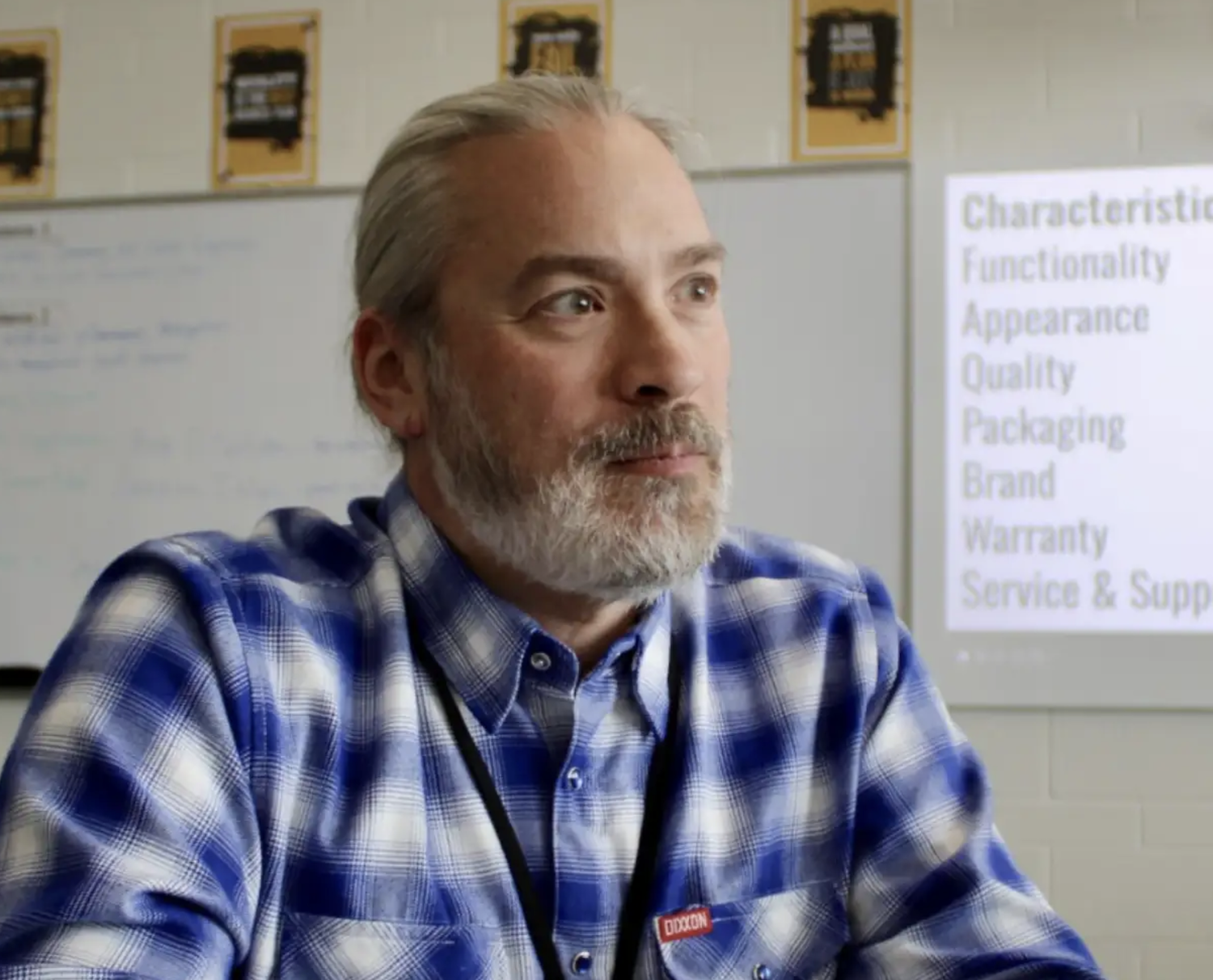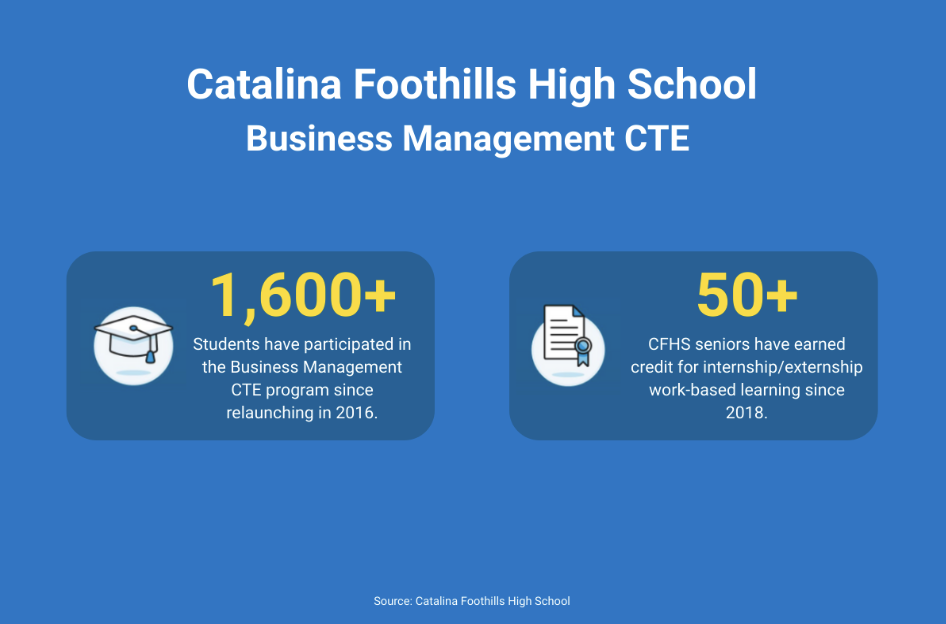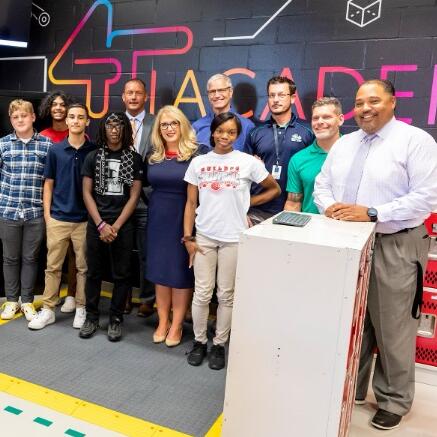Careers
How One CTE Teacher Is Instilling Career Skills—and Confidence—in Students
Nestled at the base of the Santa Catalina Mountains in Tucson, Arizona, sits the Catalina Foothills community, home to Catalina Foothills High School (CFHS), fondly referred to as “Cat Foot” by locals.
CFHS is home to a powerful fleet of career and technical education (CTE) courses, including the Business Management track. The curriculum and student success stories are impressive; let’s meet the educator who has made the four-course program what it is today.
Air Force veteran and business-professional-turned-high-school-teacher Jason Reinhardt is the kind of teacher you hope your child has while in high school (and the kind of teacher you wish you’d had, too).

Jason Reinhardt, Air Force veteran and business-professional-turned-high-school-teacher
There wasn’t much left of the previous business and marketing program at CFHS when Jason was asked to take over, but he was promised the freedom to rebuild it from the ground up with full support from his principal and superintendent. He’d be the first to tell you that this work is important and rewarding, but it isn’t easy.
Bringing Industry Insights to Classroom Curriculum
“My ultimate goal was to build the most robust and project-based-learning program that I could,” Jason said. “That immediately started with knocking on doors in our community—to get businesses, industry professionals, the University of Arizona, and local chambers of commerce involved to set the standard and get these students prepared to go right into industry or be successful at university.”
He leveraged strong industry partnerships and community involvement to inform the course curriculum, ensuring he offered the most relevant learning experience for students to equip them with skills that align with employers’ needs:
- Year 1 of the program focuses on entrepreneurship, requiring students to develop business projects and present to panels made up of local business owners.
- The second year emphasizes business and community development, leadership, and client-based projects.
- Year 3 involves a work-based-learning internship with academic research components.
Over the years, Jason has created additional courses covering topics like accounting, project-based management, and personal finance. Since launching the revised course offerings in 2016, more than 1,600 students have participated in the program, and approximately 50 high school seniors have earned credit for internship/externship work-based learning since the internship course was launched in 2018.

A Win for Students, Employers, and the Economy
Students who take these courses gain technical skills like business management, budgeting, accounting and market trend analysis, and durable skills like critical thinking, collaboration, and communication. They’re also able to earn industry-recognized certifications like QuickBooks and Microsoft Office Suite.
Mr. Reinhardt’s classes gave me a significant advantage by teaching me the standard of what it takes to succeed in the business world. I learned that success goes beyond earning good grades—it requires real-world experience, networking, and a commitment to continuous learning outside the classroom. These lessons, instilled in me as early as my sophomore year of high school, have pushed me to go above and beyond what is typically expected.
Kaedin, class of 2023
While these technical skills prepare students to excel in college and the workforce, the confidence they gain in themselves is what makes it all worth it for Jason.
“Every year, I have students who think that they’ll hate this class because they’re afraid of public speaking,” Jason said. “But seeing the student who starts out with that mindset get to the point where they volunteer to present, confidently project, and really believe that what they have to say is valuable … those are the moments I consider myself lucky to witness.”
Local Employers Tap into Student Talent Pipeline
Employers in Tucson help by participating in students’ pitches, case studies, and capstone projects, but also reap the benefits of the program in the form of highly skilled entry-level talent joining the workforce.
“I hear from employers all the time that they hired one of my students, or that they hope to see more applicants with this course on their résumé,” said Jason. “It’s so cool to see our local organizations recognize the value that these kids bring to the table.”
Bringing Business Management to Students at Scale
One of the biggest challenges for educators, according to Jason, is the lack of standardization and scale for CTE courses like this one. All of the work—from creating the curriculum, to family and community outreach, to staying on top of shifts in the labor market—falls on individual teachers (many of whom are already hard-pressed for time, resources, and support from their chain of command).
Which is why he jumped at the opportunity when College Board approached him to help advise on the development of AP® Business with Personal Finance, a new course within AP Career Kickstart™, career-focused courses that lead to industry-recognized credentials and college credit for all students who want to prepare for a career.
“A course like [AP® Business with Personal Finance] is not only going to help bridge the skills gap in the labor market but will also help students really understand their personal impact on our economy,” Jason said.
“You hear some employers make sweeping statements about Gen Z lacking skills. But have they tried to help solve that gap by working with the education sector to teach the skills they need? AP® Business with Personal Finance has the potential to bring these parties together.”
“It’s a dream come true to know that College Board is putting its name and resources behind career courses that are rooted in project based learning at a national level,” Jason said. “It’s going to empower students and give educators the support they need, while leveling the playing field for so many families and communities.”
Nearly half (48%) of high school students—both college-bound and non-college bound—said they feel anxious about exploring their future careers in a study conducted by College Board and Morning Consult. Less than two-thirds said they feel they have enough information to decide on their best plan for life after high school.
This is why providing students with access to career-relevant information, career-oriented courses, and work-based learning opportunities is crucial—and students are hungry for it. In the same survey, 9 in 10 students said they would like more career exploration opportunities in school.
The College Board provides students with college- and career-focused resources, courses, and assessments to help them navigate postsecondary education and career pathways. To elevate schools and organizations that provide career information and help high school and college students build career-relevant skills, we’re publishing a series of member spotlights to help illuminate why this work is so important—and how it’s changing lives.


